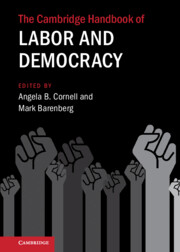Book contents
- The Cambridge Handbook of Labor and Democracy
- The Cambridge Handbook of Labor and Democracy
- Copyright page
- Contents
- Contributors
- Acknowledgments
- Introduction
- Part I Labor and Democracy: Theory and Practice
- Part II History, Politics, and Law
- Part III Labor, Diversity, and Democracy
- Part IV Country and Regional Perspectives
- 14 Labor, Workers’ Rights, and Democracy in Latin America
- 15 African Perspectives on Labor Rights as Enhancers of Democratic Governance
- 16 Why (Which) Workers Often Oppose (Which) Democracy?
- 17 Reclaiming Democracy
- 18 A Critical Assessment of Democratic Labor Unionism in South Korea from a Feminist Standpoint
- Part V Labor and Democracy Sectoral Case Studies: Platform Workers, Higher Education, and the Care Industry
- Index
- References
15 - African Perspectives on Labor Rights as Enhancers of Democratic Governance
from Part IV - Country and Regional Perspectives
Published online by Cambridge University Press: 25 January 2022
- The Cambridge Handbook of Labor and Democracy
- The Cambridge Handbook of Labor and Democracy
- Copyright page
- Contents
- Contributors
- Acknowledgments
- Introduction
- Part I Labor and Democracy: Theory and Practice
- Part II History, Politics, and Law
- Part III Labor, Diversity, and Democracy
- Part IV Country and Regional Perspectives
- 14 Labor, Workers’ Rights, and Democracy in Latin America
- 15 African Perspectives on Labor Rights as Enhancers of Democratic Governance
- 16 Why (Which) Workers Often Oppose (Which) Democracy?
- 17 Reclaiming Democracy
- 18 A Critical Assessment of Democratic Labor Unionism in South Korea from a Feminist Standpoint
- Part V Labor and Democracy Sectoral Case Studies: Platform Workers, Higher Education, and the Care Industry
- Index
- References
Summary
The importance of the struggle for labor rights and challenges to democracy in Africa can be linked to the decolonization process in the 1960s. Trade union formations had relative collective capacity to support agitation for political emancipation. The post-colonial relationship between labor movements and the state have been a mixed experience. We explore the role of labor rights as enhancers of democratic governance in Africa, using several countries as proxies for the continent. Exploration is informed largely by the ILO’s recent Centenary reflections, the link between labor rights and social justice, issues canvassed by the Global Commission on the Future of Work. The Commission provided a basis for continuing reflection among scholars and policy makers. It culminated in a rejuvenation and renewal of ILO mandate at the Centenary International Labor Conference, 2019.
- Type
- Chapter
- Information
- The Cambridge Handbook of Labor and Democracy , pp. 250 - 262Publisher: Cambridge University PressPrint publication year: 2022



